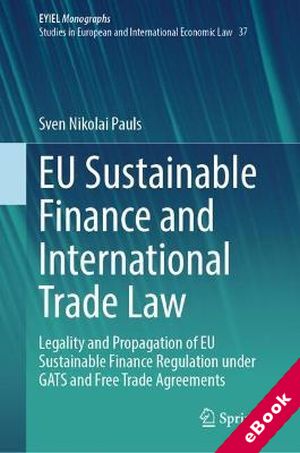
The device(s) you use to access the eBook content must be authorized with an Adobe ID before you download the product otherwise it will fail to register correctly.
For further information see https://www.wildy.com/ebook-formats
Once the order is confirmed an automated e-mail will be sent to you to allow you to download the eBook.
All eBooks are supplied firm sale and cannot be returned. If you believe there is a fault with your eBook then contact us on ebooks@wildy.com and we will help in resolving the issue. This does not affect your statutory rights.
This book offers an in-depth analysis of the interrelation between the European Union's ESG regulation (or Sustainable Finance) and international trade law, which to date have only been assessed separately. The inherent similarities and intersections between cross-border provision of financial services and international trade law may result in potential collisions and opportunities for advancing legislation in the field. The potential collisions and opportunities primarily stem from the differing approaches of these regulatory concepts. Whereas the standards derived from the General Agreement on Trade in Services (GATS) and the EU's free trade agreements aim at securing an overall balance of rights and obligations between states, Sustainable Finance intends to re-channel private capital into sustainable investments. Against this background, this book primarily intends to answer two interrelated questions: Are the EU's Sustainable Finance provisions legal under, in other words consistent with, international trade law? Which role can international trade law play in the propagation and justification of Sustainable Finance policy?
Guided by these questions, this book offers the reader a three-step analytical approach towards the topic: First, this book provides a comprehensive overview of all relevant EU Sustainable Finance regulations and publications. The particular value of this overview results also from its focus on the respective legislative background and interrelation with international policy frameworks, such as UN development and climate protection agreements or bilateral working groups. This overview is followed by an analysis of the potential for collision between the EU's Sustainable Finance legislation and its obligations under GATS and EU free trade agreements. Finally, this book identifies actual and possible channels of propagation and justification of Sustainable Finance policy through the WTO framework and the EU's free trade agreements. This analysis is further supported by an overview on best practices and regulatory proposals on potential future consolidation of Sustainable Finance and international trade law. This book is thus highly relevant both for practitioners in cross-border financial services and international trade law as well as researchers and EU legislators wishing to understand the challenges and opportunities of implementing Sustainable Finance in light of international trade law.